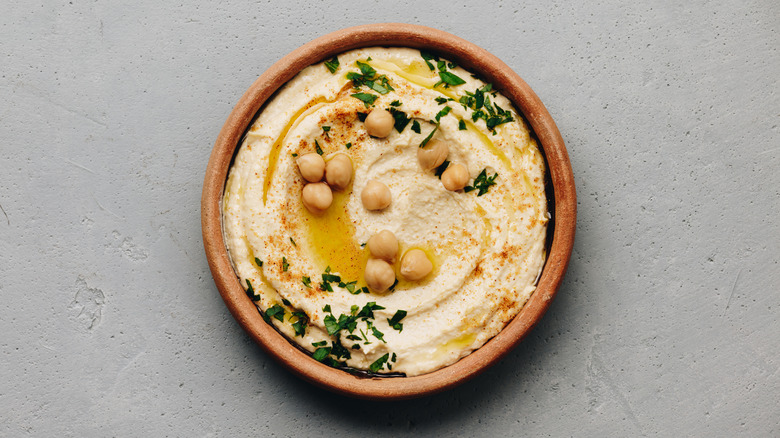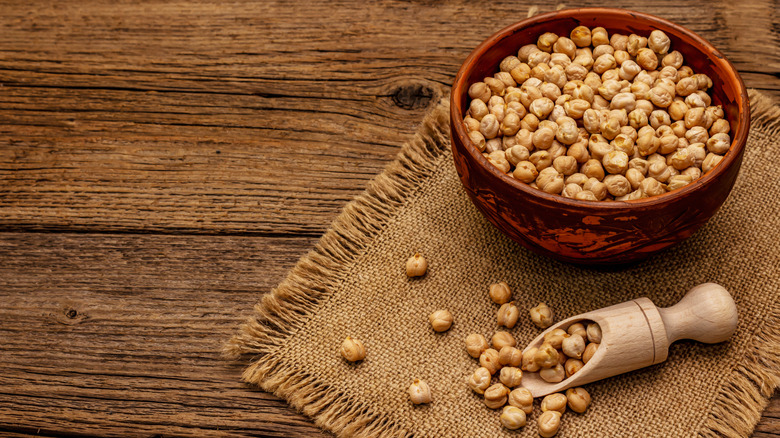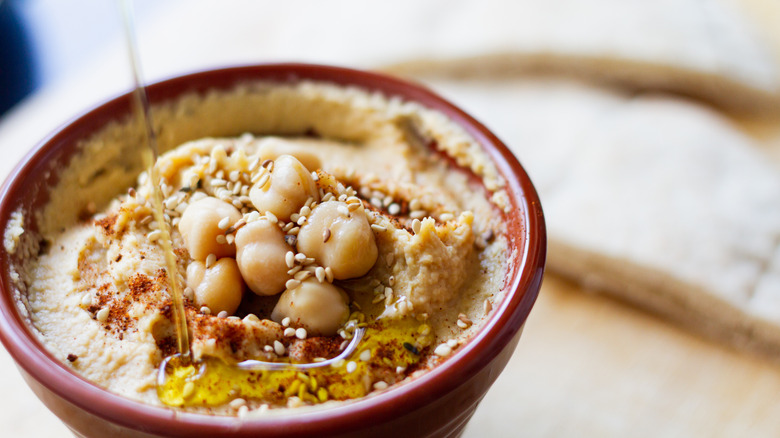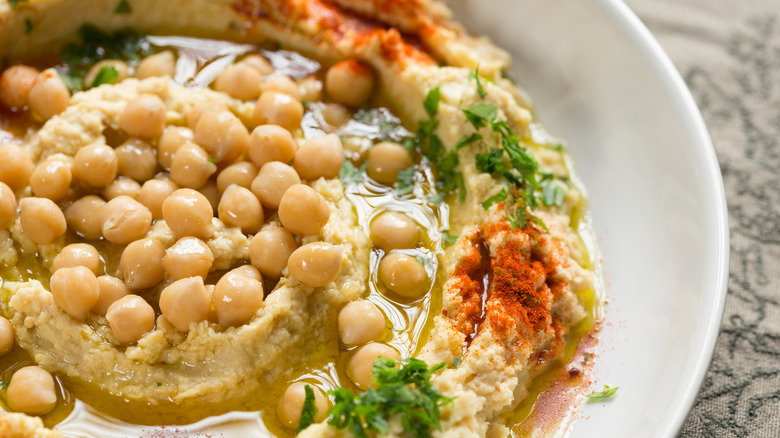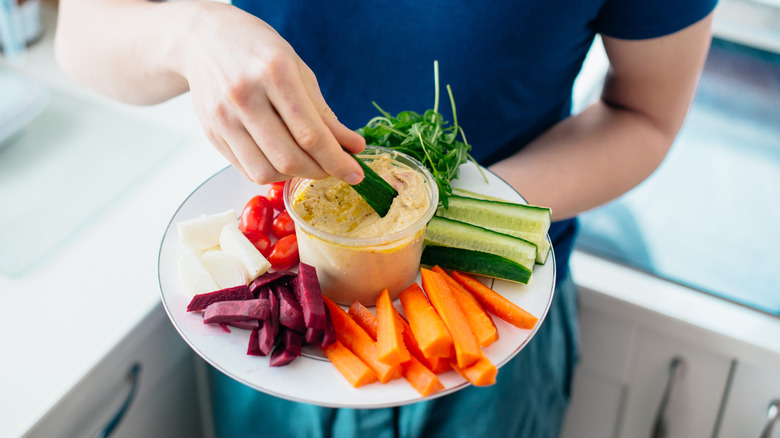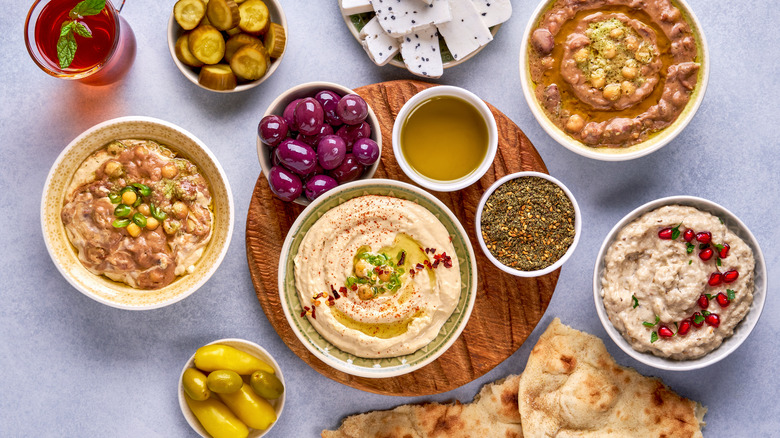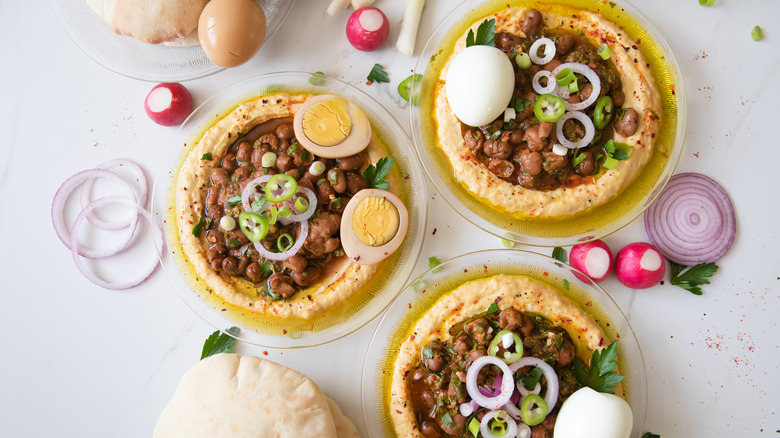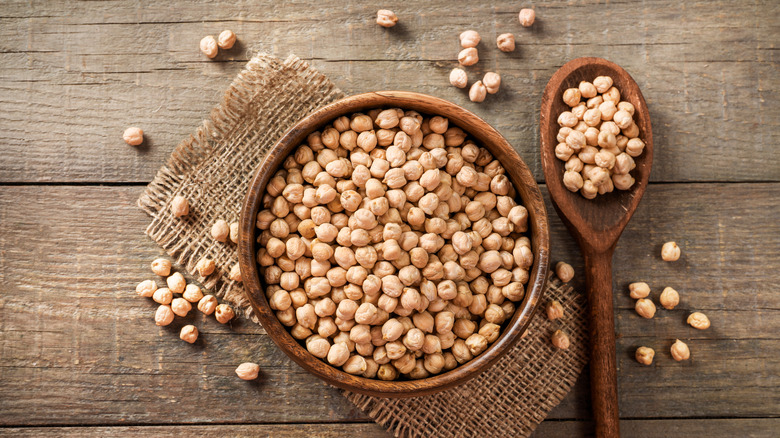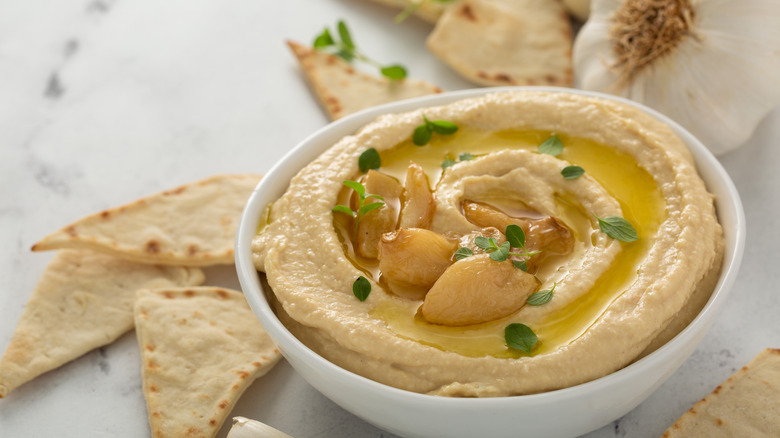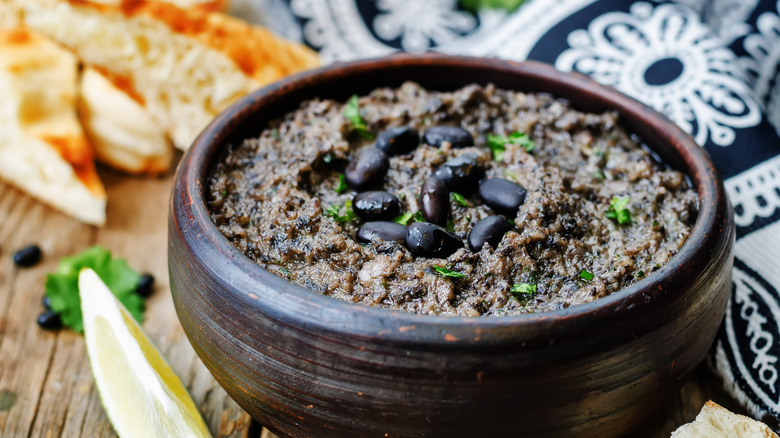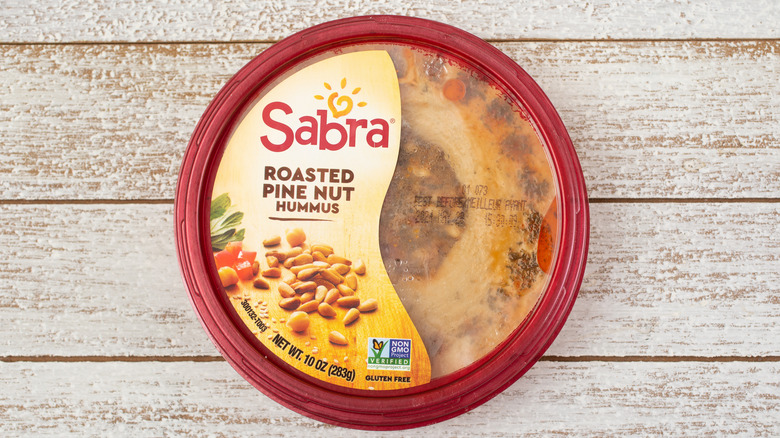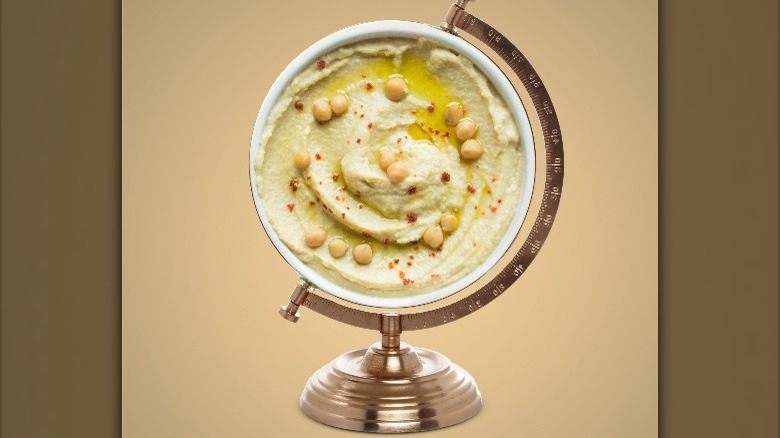The Untold Truth Of Hummus
A stalwart favorite among vegans and vegetarians, hummus in the U.S. has evolved from its original pigeonholing as a crunchy-granola health food to a true kitchen staple (via Quartz). These days, hummus is known as the perfect dip to serve with veggies or crackers and the ideal plant-based, protein-rich sandwich filling to accompany falafel, grilled vegetables, or enjoy solo.
As hummus' popularity and omnipresence continue to grow, the selection of available flavors has too. Supermarkets are heartily stocked with different brands and varieties, topped with anything from whole chickpeas to pine nuts, and infused with flavors ranging from chili peppers to chocolate. Meanwhile, recipes for homemade hummus range from plain to pumpkin-flavored and can easily be infused with pesto or enriched with creamy avocado.
But before there was dessert hummus, there was plain old hummus — better known, according to the BBC, as hummus b'tahini, which literally translates to chickpeas with tahini. The dip's Arabic name gives us at least one clue about its long and somewhat disputed history; we've got the scoop on the rest.
The origins of hummus are highly disputed
Multiple cultures lay claim to the original recipe for hummus, and The Spruce Eats highlights a rift between Greeks, Israelis, and Arabs over who was the first to blend chickpeas with sesame to produce the rich purée we know today. There's even more dissent within these groups, and the BBC indicates that among others, the Lebanese, Turks, Syrians, and Egyptians all assert that hummus b'tahini originates from their cuisines. The Spruce Eats points to evidence in favor of the Egyptians introducing the dish, and indeed, Middle East historian Ari Ariel tells the BBC the earliest recipe resembling hummus hails from the pages of a 13th-century cookbook from Cairo. That said, Greece shares many culinary specialties with the Arab world due to a long trade partnership between the two regions, and some believe that the dip could have arisen there.
The BBC also provides evidence pointing to a Jewish origin, and chef Tom Kabalo of Raq Hummus in Israeli-occupied Golan Heights tells the outlet that hummus is referred to in the Hebrew Bible, which dates back at least three millennia. Meanwhile, American food historian and medieval Arab food expert Charles Perry tells the BBC that Damascus, Syria is the more probable homeland of hummus, as the method used to whip the dip suggests an urban aristocratic origin. The debate might come full circle since Turkish rulers were present in the city in the 18th century.
Its origin story launched an international dispute
In 2008, the BBC reports that the disagreement over the dip's origins led to the so-called Hummus Wars. Lebanon blamed Israel for taking unearned ownership of a culinary legacy that the Lebanese believed to be rightly theirs. A Lebanese industrial group not only sued Israel for breach of food copyright but requested that the European Union acknowledge hummus as Lebanese once and for all. Neither attempt bore fruit and instead, they point to just how contentious the issue is.
There is indeed some evidence in favor of Lebanon's claims, and food historian Charles Perry names Beirut as his second choice origin city for hummus (via BBC). Nonetheless, the probable answer is that multiple cultures are responsible for the creation of the chickpea dip. "Hummus is a Middle Eastern food claimed by all and owned by none," Oren Rosenfeld, writer and director of "Hummus! The Movie," tells the BBC. The outlet remarks that indeed, many people in the hummus business opt for the diplomatic route and eschew taking any side at all.
Hummus is in the Guinness Book of World Records
Given the difficulty of proving hummus' exact origins, Lebanon decided to lay another claim on the beloved dish: If it couldn't be undeniably confirmed as its birthplace, it would be home to the largest plate of hummus ever served.
The BBC reports that in 2009, the Lebanese minister of tourism Fadi Abboud decided to make a 2,000-kilogram (4,409-pound) plate of hummus. It didn't hold the World Record for long, since hummus hotspot Jewdat Ibrahim in Israel quickly responded with a plate double that size. The following year, the Lebanese went all out when Chef Ramzi Choueiri and a cohort of around 300 students from Beirut's Al-Kafaat University made a plate of hummus that weighed a whopping 10,452 kilograms (23,043 pounds). Thus far, there has been no retaliation and this monstrous plate of hummus has held the prize in the Guinness Book of World Records ever since.
Hummus is really good for you
If hummus became the vegetarian and vegan lunch option par excellence in the '70s as per Quartz, it's in no small part thanks to its impressive health profile. Chickpeas are the core ingredient of the dish and they're a veritable nutritional powerhouse. High in fiber, rich in brain-boosting choline, and boasting a whopping 15 grams of protein per cupful, according to WebMD, chickpeas also contain essential vitamins and minerals like iron, calcium, and folate. Consuming chickpeas also triggers the production of butyrate, a short-chain fatty acid that has been clinically shown to assist the body in eliminating sick and dying cells. Butyrate in collaboration with the lycopene and saponins present in chickpeas, may contribute to a lower risk of cancer (via WebMD).
Tahini, a sesame paste that is the other main ingredient in hummus, is ultra-rich in protein, B vitamins, and other vitamins and minerals, according to The Guardian. Meanwhile, superfood garlic, which lends its pleasant and powerful aroma to hummus, is a proven antimicrobial with loads of immune-boosting compounds, as per Healthline. Garlic's laundry list of health benefits includes a decrease in blood pressure, bad cholesterol levels, and the risk of cancer. It's no surprise that hummus is excellent for gut health, heart health, weight management, and more as BBC Good Food explains.
Hummus is not a dip
Despite how we frequently consume hummus in the U.S., a headline from The Guardian crows: "Spread the word: if you think hummus is a dip, you've been doing it wrong." Divisive as the statement might seem, the outlet has a point. In its country of origin (whichever that may be) hummus is not perceived as a pre-dinner dip, but rather as part of the main meal. Indeed, Quartz reports that hummus often shows up along with a selection of mezze (small dishes). A good hummus, Lebanese chef Kamal Mouzawak tells Quartz, is far from an afterthought: It's a sign of a good restaurant.
Although hummus isn't originally intended as a dip, you don't need to feel bad about your eating habits. Mouzawak tells Quartz that "Americans are accustomed to a dip like a guacamole or a salsa already." He remarks, "The similarity of already existing patterns makes it easier to introduce exotic products like hummus. Food is the best ambassador always." So feel free to dip if you want to, but also consider trying hummus the more traditional way. (More on that in a second!)
Hummus is traditionally served with toppings
So if hummus isn't usually eaten as a dip in its native lands, how is it served? With a plethora of toppings, of course! Quartz notes that in the Middle East, hummus is most commonly served in a shallow bowl, topped with anything from whole chickpeas, pine nuts, and ground lamb. To this list, Haaretz adds fava beans, sautéed mushrooms, or boiled eggs, and a simple drizzle of olive oil is always welcome.
Toppings aren't the only way you can mix up your hummus experience. Haaretz explains that in Israel, it is available in three different varieties: plain or classic; hummus tehina, which is heaped with tahini; and masabacha, which uses chickpeas that are cooked longer and left whole.
Whichever style of hummus you opt for, in the Middle East it will be served with pita bread. Mo Moubayed, co-owner of Sydney's Thievery tells The Guardian to "eat it with your hands and Lebanese bread and lots of really good olive oil." To do this without making a mess, the bread should be held with your fingertips and dragged through the hummus clockwise, "with a quick flick of the wrist." It certainly demands a bit of deftness, but practice makes perfect!
For a truly creamy hummus, you're meant to peel the chickpeas
If there's one element people can agree on according to the BBC, it's that hummus is a labor of love — emphasis on the labor. Indeed, one of the fundamental steps to a smooth, creamy hummus is the meticulous task of removing the membrane-like skin from each and every one of the chickpeas. While it might seem like an unnecessary fuss, according to Lifehacker, this seemingly tough job isn't nearly as time-consuming as you'd think. Simply pinch off the skins one by one, dropping each individual chickpea into a bowl as you go. Once you've got the hang of it, it's a mindless operation perhaps best performed with a background distraction.
That said, it's admittedly not the ideal technique for peeling large quantities of chickpeas. For that, Lifehacker suggests taking a cue from Yotam Ottolenghi's expertise. The Israeli chef boils his chickpeas in baking soda-tinged water to release and dissolve the skins. While this technique was developed for use with dried chickpeas, Cook's Illustrated developed a similar method to speed up the peeling process with canned chickpeas as well. With either method, you're sure to be rewarded with a smoother and creamier hummus than if you had left the skins intact.
You can also buy an instant hummus-making machine
If laboriously peeling each individual chickpea for homemade hummus seems like way too much work, Strauss Group has a solution: an instant hummus-making machine. Aimed at cafés and restaurants rather than home cooks, the Humix machine is a self-cleaning contraption that purports to make perfect hummus every time (via ISRAEL21c).
The machine's launch was announced at the end of 2021, and while it currently remains unique to Israel, that may not be the case for long. Given the ever-increasing popularity of Middle Eastern food in the U.S., where according to Brand Genetics, it has become a "dramatic driving force" in recent years, we could certainly see such a contraption catching on. This holds especially true seeing as Strauss isn't only the manufacturer of Humix, but also the company behind Sabra, characterized by The Washington Post as "the runaway best-selling brand" of hummus in the United States in 2019.
It isn't really hummus without chickpeas
Head to any grocery store or look at any hummus recipe roundup and you're likely to find hummus made with anything from white to black beans, and split peas to lentils. Quartz highlights a version made with cranberry beans and smoked maple syrup, and Lantana makes an iteration with white beans seasoned with pumpkin spice. While the creativity is certainly fun for your tastebuds, in this case, a rose by any other name is no longer a rose. Hummus is the Arabic word for chickpeas, so a hummus devoid of chickpeas is really just a bean dip.
Greatist details a divide between Middle Eastern hummus — the diversity of which is defined by changes in the toppings — and American hummus, which includes creations that Middle Easterners might have a hard time recognizing and or considering on par with the real deal. Nevertheless, each can be enjoyed in its own way.
National Hummus Day is celebrated in May
You can tell that a food is on-trend in the U.S. when it gets its own holiday. True to form, alongside other foodie favorites, you can celebrate National Hummus Day every year on May 13. The initiative for a day devoted to the chickpea dip was established by hummus bigwig Sabra in 2013, according to Supermarket Perimeter.
Sabra has long been a market leader in American hummus, with more than a 60% market share in 2015, according to Statista. In 2021, Sabra took advantage of the then eight-year-old tradition to launch a new flavor: Everything Bagel Seasoned Hummus with onion, sesame seeds, poppy seeds, and garlic. The company also launched a TikTok video challenge and Instagram filters and stickers to help "Hummusapians" share their love of the food. Keep an eye out for yearly prizes, discounts, and novel flavors to celebrate National Hummus Day.
The market for hummus is growing outside of its native land
It might seem as though hummus' popularity has reached its peak, but it turns out that interest continues to rise with no signs of stopping. According to Fortune Business Insights, the global hummus market spiked directly following the start of the COVID-19 pandemic, exploding from a 2020 market size of $2.62 billion to $2.95 billion in 2021. The market analyst company found that global hummus sales "exhibited a stellar growth" during this period as compared to the previous years on record, due in part to a desire for healthier snacking options during lockdowns.
But the pandemic isn't the only reason hummus consumption is increasing around the world. According to the report, the ever-growing plant-based diet trend has contributed quite a bit to its gain in popularity. Indeed, Green Queen indicates that a 2021 Euromonitor report found that 42% of global consumers self-identified as flexitarians. Business Insider reports that this group — not vegans or vegetarians, who only make up 2% and 4% of the U.S. population respectively, as per The Vegetarian Resource Group – are the ones driving the demand for more plant-based foods like hummus on supermarket shelves.
